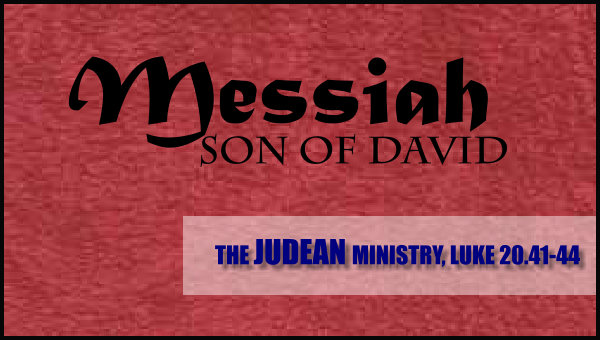By Tyson Thorne

The Judean Ministry at Various Cities (18.1-24.53), 20.41-20.44
Continuing his verbal assault on the religious leaders, Jesus asks a question about the Messiah. The question reveals something the religious leaders of the day never considered, and makes an obscure reference to near future they wouldn’t understand. What is this question? The Messiah is supposed to be a “Son of David”, but if so how is it that David calls him “Lord” (something a king would never do to a son)? The answer the religious leaders may have come up with, though it would have run contrary to their understanding of the nature of God, is that the Messiah is divine.
This answer would have been rejected out of hand due to the Shema. For those not familiar with Jewish teaching, the Shema is from Deuteronomy 6.4 and states, “Listen, Israel: The Lord is our God, the Lord is one!”. This is the foundational reason Judaism rejects the notion of the Trinity to this day, and one of the reasons the religious leaders would want to kill Jesus. After all, he was claiming to be divine and telling people to follow him; from their perspective, this would have been heresy and punishable by death. To borrow a phrase from Sherlock Holmes (The Adventure of the Bruce-Partington Plans), “We must fall back upon the old axiom that when all other contingencies fail, whatever remains, however improbable, must be the truth.” A lesson the religious leaders needed to learn.
The fact that Jesus, the Messiah, is divine is the first part of the answer as to how he can be both David’s son and the Messiah but what is the second? Peter discovered it, and Luke tells us about the discovery in Acts chapter 2. Peter, when speaking to thousands in front of the temple on the day of Pentecost, used this same passage to prove Jesus is the Messiah and divinity:
“Brothers, I can speak confidently to you about our forefather David, that he both died and was buried, and his tomb is with us to this day. So then, because he was a prophet and knew that God had sworn to him with an oath to seat one of his descendants on his throne, David by foreseeing this spoke about the resurrection of the Messiah, that he was neither abandoned to Hades, nor did his body experience decay. This Jesus God raised up, and we are all witnesses of it. So then, exalted to the right hand of God, and having received the promise of the Holy Spirit from the Father, he has poured out what you both see and hear. For David did not ascend into heaven, but he himself says, ‘The Lord said to my lord, “Sit at my right hand until I make your enemies a footstool for your feet.”’ Therefore let all the house of Israel know beyond a doubt that God has made this Jesus whom you crucified both Lord and Messiah.”
The resurrection is the second piece of the answer as to how the Messiah can be both David’s son and the Messiah simultaneously. One has to wonder, though, why raise this question in the first place?
There are a couple possible reasons, and likely it is both of these reasons combined. Reason number one: to reinforce that resurrection is real. Prior to posing the question, Jesus was teaching about the Kingdom and, as a result of question meant to trap him, revealed that resurrection is real. Not only was there no marriage in heaven (the answer to the question raised by the Sadducees) but that the resurrection was inferred in the Old Testament (why else refer to the Lord as the God of Abraham, Isaac and Jacob?).
It is after proving that the resurrection is real that he asks the question about the Messiah. To answer the question one must understand not only that resurrection is real, but that reason number two) God exists in Trinity. How else can the Messiah be divine? If Jews were ever going to accept the salvation message they had to understand both truths. What he says here will be proven in a few short days by an empty tomb.
|
|